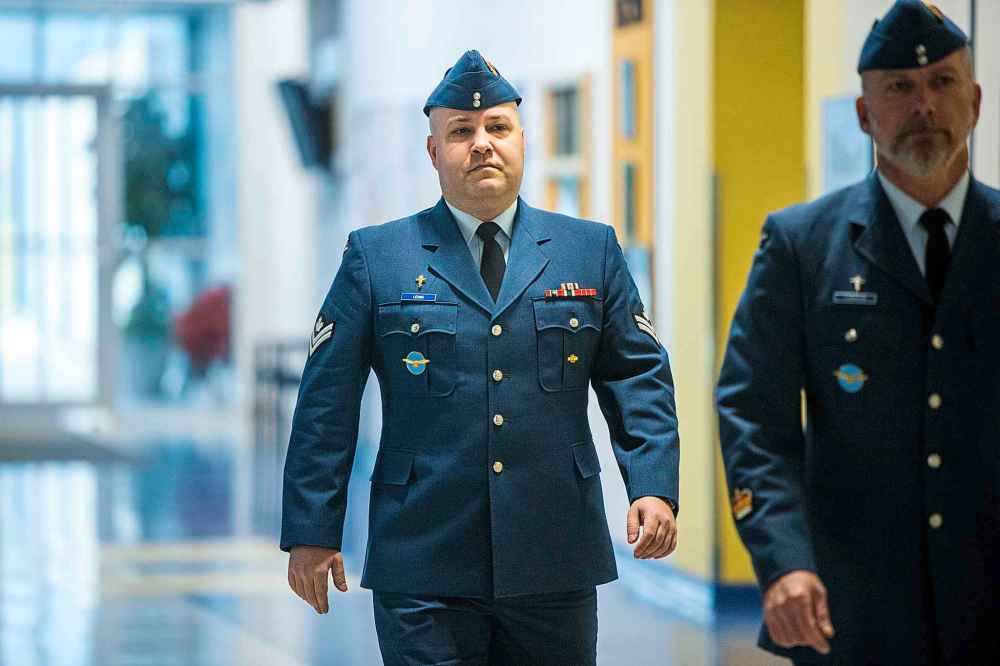Alleged hit to genitals at centre of court martial hearing
Read this article for free:
or
Already have an account? Log in here »
To continue reading, please subscribe:
Monthly Digital Subscription
$0 for the first 4 weeks*
- Enjoy unlimited reading on winnipegfreepress.com
- Read the E-Edition, our digital replica newspaper
- Access News Break, our award-winning app
- Play interactive puzzles
*No charge for 4 weeks then price increases to the regular rate of $19.00 plus GST every four weeks. Offer available to new and qualified returning subscribers only. Cancel any time.
Monthly Digital Subscription
$4.75/week*
- Enjoy unlimited reading on winnipegfreepress.com
- Read the E-Edition, our digital replica newspaper
- Access News Break, our award-winning app
- Play interactive puzzles
*Billed as $19 plus GST every four weeks. Cancel any time.
To continue reading, please subscribe:
Add Free Press access to your Brandon Sun subscription for only an additional
$1 for the first 4 weeks*
*Your next subscription payment will increase by $1.00 and you will be charged $16.99 plus GST for four weeks. After four weeks, your payment will increase to $23.99 plus GST every four weeks.
Read unlimited articles for free today:
or
Already have an account? Log in here »
Hey there, time traveller!
This article was published 19/11/2018 (2578 days ago), so information in it may no longer be current.
A Canadian Forces member pleaded not guilty Monday to quarrelling with another Forces member and using “provoking gestures” – described as “bag-tagging.”
The court martial that began at 17 Wing heard Master Cpl. Nicholas J. Lewis faces two charges under the Code of Service Discipline relating to an alleged incident at an axe-throwing venue in Winnipeg on Oct. 27, 2017.
Lewis is accused of hitting a fellow master corporal in the genitals with an axe handle. He faces one charge of “quarrelling with a person” and one charge of “using provoking gestures toward a person, tending to cause a quarrel” — violations of the National Defence Act.

Why court martial?
The need for a separate justice system to enforce disciplinary standards in the military has a history that dates to the earliest organized armed forces.
More recently, in 1992, the Supreme Court of Canada recognized the continuing need for a separate system of military justice: “Canada depends on the Canadian Forces to defend against threats to our security and the military must be able to enforce discipline effectively and efficiently in order to maintain its readiness. Accordingly, breaches of discipline must be dealt with speedily and will often result in more severe punishments than what a civilian might receive for the same conduct.”
The Supreme Court acknowledged military tribunals are designed to meet the disciplinary needs of the Canadian Forces and the ordinary courts would generally be inadequate to serve the particular needs of the military.
— source: National Defence, Canadian Armed Forces
In a videorecorded Nov. 27, 2017, interview with military police Cpl. Simon-Pierre Crete — shown at the court martial Monday — Lewis described the axe-throwing competition as getting testy, with heckling and lots of “chirping.”
He said Master Cpl. K.A.W. (Kyle) VanGenne was very competitive and especially critical of him, so he “shouldered” VanGenne after completing his turn and walking past him.
“I did not make contact with that man’s genitals, nor did I think about doing that,” Lewis said in the interview with the military police. He said he “nudged” the other man with his shoulder as he walked past.
The military police officer conducting the interview told Lewis the alleged victim, and a second Canadian Forces member at the event, described the “bag-tagging” incident.
“Two people saw you make contact with his groin area,” Crete told Lewis.
Lewis replied such action is not something he or any of his peers would do: “I don’t think people do that stuff anymore.” Besides, Lewis told the police officer, if that had happened, the alleged victim would likely have had a noticeable physical reaction.
“Wouldn’t that leave you in a incapacitated state – getting bag-tagged?” said Lewis, who is with the Canadian Forces School of Survival and Aeromedical Training.
Lewis said when he learned of the charges against him in 2017, he contacted the axe-throwing venue to see if he could review its surveillance recordings. He said he was told the business doesn’t keep its recordings for that length of time.
The interview was played on the first day of the Code of Service Discipline court martial that is to hear from several witnesses and scheduled to last two weeks.
Military Judge Commander Martin Pelletier, who presides at courts martial across Canada, is in Winnipeg to hear the disciplinary case.
The Code of Service Discipline is the basis of the Canadian Forces military justice system. It is designed to assist military commanders in maintaining discipline, efficiency, and morale within the Canadian Forces. It is part of the National Defence Act.
The Supreme Court of Canada in 1992 ruled the military needs to maintain discipline in order to “maintain its readiness.”
“Accordingly, breaches of discipline must be dealt with speedily and will often result in more severe punishments than what a civilian might receive for the same conduct,” the high court stated.
carol.sanders@freepress.mb.ca

Our newsroom depends on a growing audience of readers to power our journalism. If you are not a paid reader, please consider becoming a subscriber.
Our newsroom depends on its audience of readers to power our journalism. Thank you for your support.
History
Updated on Monday, November 19, 2018 6:05 PM CST: Adds photo








